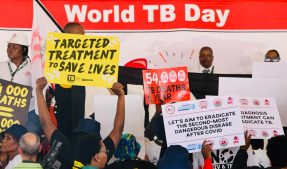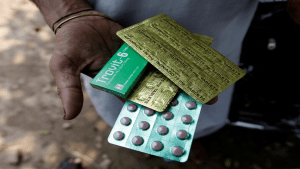Researchers at the Africa Health Research Institute are conducting a new long-term study in one of the global epicentres of the HIV/Aids pandemic, at Hlabisa on the KwaZulu-Natal North Coast. The Vukuzazi Study will look at the possibility of HIV/Aids impacting on non- communicable diseases like cancer, high blood pressure or diabetes, as it did with TB.
The Hlabisa area of the Umkhanyakude district on the KwaZulu-Natal North Coast has long been considered one of the global epicentres of the HIV/Aids pandemic. For this reason it has long been a focal point for research in this field. The Africa Health Research Institute (AHRI) is now undertaking a new, long term study into genetics and general health history of the region’s inhabitants.
Doctor Mark Siednerv of AHRI says that they are going to enrol 30 000 people and do a thorough check on their health status.
“So Vukuzazi, I think, in its best form, in its purest form is going to be the Framingham Heart Study of South Africa. We are going to enrol up to 30 000 people, not in health centres, not in clinics, but in the community. And we’re going to understand do they smoke, do they drink, do they have hypertension, do they have diabetes, do they have HIV, is it being treated, do they have tuberculosis, did they have it in the past? We know this population well because we’ve been working in this area for the past 20 years. So we know about their household wealth, we know about their educational status, we know who’s in their community.”
Siedner says the Vukuzazi study could do for HIV/Aids what the long-term study at Farmingham, Massachusetts, since 1949, has done in understanding the causes of heart disease, like smoking and high cholesterol.
AHRI director Professor Deenan Pillay explains that, apart from screening for HIV and TB, they are also taking genetic and fecal samples of participants.
“We are able to take samples to look at the genetics of somebody, which of course do not change over life, but equally we’re looking at other components of their body that will also contribute to disease. And to be able to have both those sets of data, together with high rates of HIV, which is pretty unique in this setting, will allow us to understand precisely why individuals in this population get disease or are protected from disease.”
The study started earlier this year and this phase is expected to run until 2019 or 2020. Pillay explains that they are holding local health fairs to attract up to 70% of residents from a particular area. Field workers visit homes the day before to alert people about the fairs. Vukuzazi’s bright orange tents can be seen from afar.
Project co-ordinator Resign Gunda says people do not have to walk more than 2 kilometres, which is much closer than the local clinic. Participants also receive food vouchers.
“So one of the challenges we have, and one of the of the surprising things to my mind, is how much stigma there is about HIV despite the fact that everybody knows someone or has someone in their family who has HIV or has died of HIV. That’s astounding to me and there’s a complex set of reasons for this.”
Siedner says it is expected that the incidence of HIV and TB will decrease over time, but what other health needs may the pandemic create as people with HIV/Aids live longer?
“Most of my research in Uganda tests the hypothesis that people with HIV tend to have more non-communicable diseases like hypertension, stroke, high blood pressure, heart attacks, cancer, than people without HIV. This study is going to be very uniquely positioned to answer that question. If we can get on top of the HIV epidemic, and I suspect we will, what are going to be the health priorities with a population where the HIV prevalence is 40%? If HIV becomes a chronic disease like hypertension and people take their one pill a day to stay controlled, what are the health priorities for this population?”
Gunda says the health fairs are attracting men who are normally reluctant to go to clinics. Many of them want to undergo chest X-rays to see if they have TB due to the nearby Somkhele Coal Mine. He says as breadwinners, they also want to monitor their general health.
Watch related video below:






